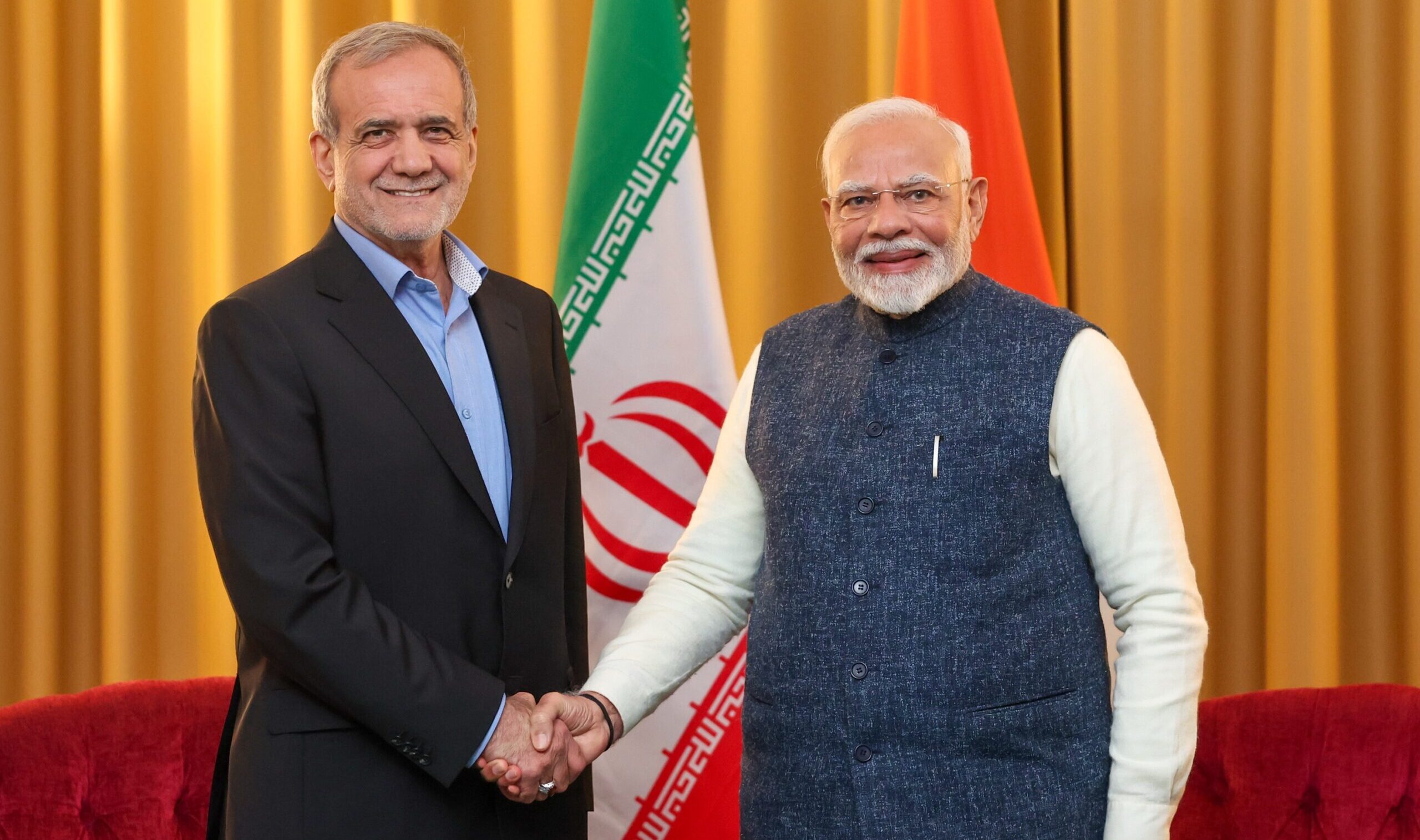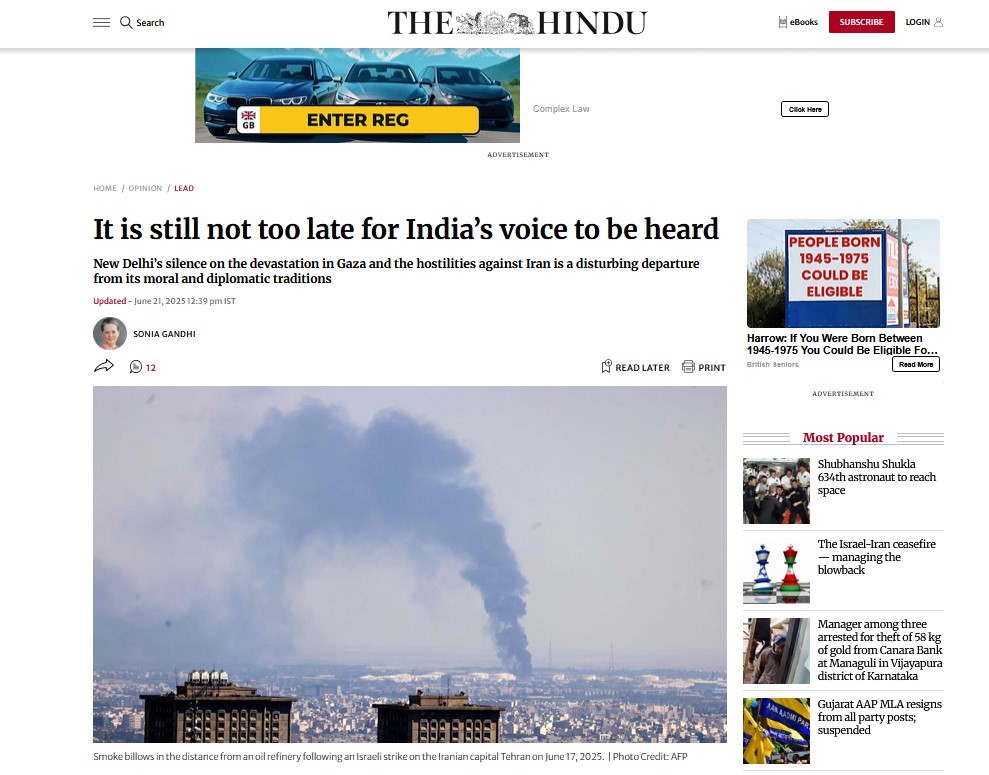
M Ghazali Khan
Iranian President, Masoud Pezeshkian, recently phoned India’s Prime Minister, Narendra Modi, to brief him on the attacks against Iran by Israel and the US. According to a statement from India’s Ministry of External Affairs, Modi expressed “India’s deep concern at the recent escalations” and “conveyed that India was on the side of peace and humanity.” The statement emphasised Modi’s call for “immediate de-escalation, dialogue, and diplomacy” and reiterated India’s support for the early restoration of regional peace, security, and stability.
However, Modi’s well-known friendship with Israeli Prime Minister Benjamin Netanyahu—and their shared anti-Muslim stance—casts doubt on the simplicity of the exchange. It is unlikely that the Iranian President’s phone call was as straightforward as the official statement suggests, especially following India’s formal decision to distance itself from a Shanghai Cooperation Organisation (SCO) statement that condemned Israeli strikes on Iran. In addition, there are reports that two Indian nationals were arrested in northern Alborz Province on suspicion of spying for the Israeli intelligence agency Mossad.
However, Modi’s well-known friendship with Israeli Prime Minister, Benjamin Netanyahu, and their shared anti-Muslim stance cast doubt on the simplicity of the exchange. It is unlikely that the Iranian President’s phone call was as straightforward as the official statement suggests.
Iran has historically assisted India on several critical occasions, and Pezeshkian probably reminded Modi of his country’s past favours, including a significant intervention in 1994.
At that time, facing international pressure over its human rights record in Kashmir, India was at risk of UN sanctions led by the Organisation of Islamic Cooperation (OIC) and Western powers. The then Indian Prime Minister, P.V. Narasimha Rao, sent a seriously ill External Affairs Minister, Dinesh Singh, to Tehran on a secret mission.
Singh’s arrival shocked Iranian officials, but after intensive discussions with Iranian leadership, Iran agreed to block the OIC resolution condemning India at the UN Human Rights Commission. This diplomatic move, according to veteran journalist Iftikhar Gilani and diplomat M.K. Bhadrakumar, was crucial in shielding India from international sanctions and preventing the Kashmir issue from being internationalised at the UN.
Far from showing gratitude to Iran’s favour India has taken a cautious and often ambiguous stance toward Iran, reflecting its effort to balance relations between Tehran and its Western partners.
India abstained from key IAEA votes in 2022 and 2025 criticising Iran’s nuclear compliance, as well as from UN Human Rights Council resolutions condemning Iran’s human rights abuses following the Mahsa Amini protests. While maintaining official trade ties, India largely complied with U.S.-led sanctions after the 2018 re-imposition, significantly reducing its oil imports from Iran. Additionally, India’s growing strategic and defence cooperation with Israel has occasionally aligned it with Western and Israeli positions in international forums, further straining its relationship with Iran.
The BJP-led government’s perceived unfriendly stance toward Iran has not gone unnoticed. Even senior opposition leaders like Sonia Gandhi have criticized the government’s silence on Israel’s attacks on Iran and Gaza, condemning it as a “surrender of its values.”
Writing in the Hindu she attacked the government for remaining silent on Israel’s offensive in Gaza and on Iran. “New Delhi’s silence on the devastation in Gaza and now on the unprovoked escalation against Iran reflects a disturbing departure from our moral and diplomatic traditions. This represents not just a loss of voice but also a surrender of values,” Sonia Gandhi wrote in the article,” she wrote.

Interestingly, the Iranian Embassy in Delhi thanked everyone in India—except the government—for their support. A message posted on the social media platform X said: “On the occasion of the Iranian nation’s victory in the face of military aggression by the Zionist regime and the United States, the Embassy of the Islamic Republic of Iran in New Delhi extends its heartfelt gratitude to all noble and freedom-loving people of India — including the esteemed citizens, political parties, honourable members of Parliament, non-governmental organizations, religious and spiritual leaders, university professors, members of the media, social activists, and all individuals and institutions who, in recent days and in various forms, stood firmly and vocally with the great nation of Iran.”
Domestically, India continues to grapple with rising anti-Muslim violence and discriminatory policies under Modi’s government. In the past two months alone, there have been at least eight lynchings and numerous mob attacks against Muslims in several states, including Karnataka, Telangana, Odisha, Himachal Pradesh, and Rajasthan. Government measures such as the forced deportation of Muslim citizens to Bangladesh, the controversial Waqf Amendment Act 2025, undermining Muslim religious property rights, and the demolition of over 8,000 Muslim-owned homes in Gujarat have fuelled fears of systemic bias.
Reports highlight institutional neglect, selective investigations, and a lack of official condemnation, raising concerns that such violence and discrimination are becoming normalised. Human rights organisations and community leaders are urgently calling for accountability and the protection of minority rights in this troubling climate.
Photo: Prime Minister Narendra Modi with Iranian President Dr Masoud Pezeshkian at the 16th BRICS Summit in Kazan, Russia, on October 22, 2024. (Photo: Ministry of External Affairs, Government of India/Flickr Commons)
M Ghazali Khan,
English and Urdu Blogger and Freelance Journalist